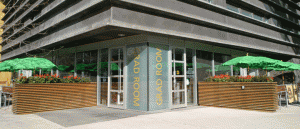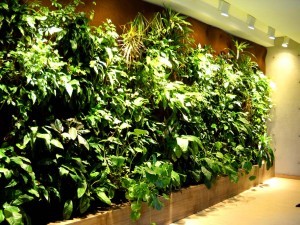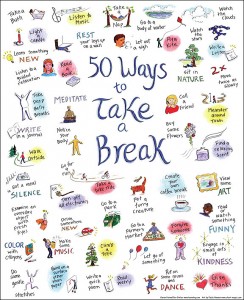Wednesday, June 7th, 2017...3:06 pm
Ain’t no rest for the grad student: on recovery and resilience in grad school
Written by: Gradlife Blogger Ekaterina An
Last week I attended the annual Jackson Lecture at Ontario Institute for Studies in Education (OISE), delivered by psychologist Dr. Katreena Scott, entitled “Mind the Gap: schools and our mental health systems.” Dr. Scott highlighted the mental health issues that often affect students, and encouraged the audience to think about mental health beyond the ‘backpack’ of diagnosable disorders. In short, she was urging educators and mental health professionals to consider the student’s school, home, and social environments as indicators and facilitators of mental well-being.
This discussion of student mental health was timely, occurring against a backdrop of increasing media coverage of the rising demand for youth mental health services. The American College Health Association surveyed over 25,000 Ontario students between 2013 and 2016, and found significant increases in mental health issues (50% increase in anxiety, 47% increase in depression, and 86% increase in substance abuse). This rise in mental health concerns is also reflected in the resources being allocated to mental health services. For example, at the University of Toronto, academic accommodations for mental health-related issues rose 143% since 2009. And as campaigns against mental health stigma grow, I find myself talking more and more openly about my own struggles with dealing with the stress and pressure of graduate school.
Although Dr. Scott’s lecture was focused on school-age children, a number of her arguments resonated with me. In particular, she discussed the importance of teaching students to cope with and recover from challenges and setbacks, and helping them to avoid a ‘cascade of failure’. In other words, Dr. Scott was speaking to the importance of building resilience, or the capacity to bounce back from difficult circumstances or failures. While the notion of resilience is a familiar part of my research (I do clinical research with individuals with advanced cancer, a population that has an incredible capacity for resilience), I had never considered it in the context of graduate school. Did resilience mean powering through and working harder in the face of setbacks, as students are often encouraged to do? Well, no. It turns out the key to building resilience lies in allowing time for rest. Taking time away from your work can give your brain a much-needed break and time to recover. Now, recovery is not synonymous with simply not working, rather it is making sure that your brain is focused on some other task or activity, without stressing over all the work you have to do.
Graduate school can be all-consuming (seriously, I have had dreams where all I do is debate the structure my thesis), so not thinking about research or coursework is a tall order. Fortunately, there are a number of great resources on campus that can help you do just that.
Grad Escapes
“Thesis avoidance with style” Grad Escapes are social, cultural, and recreational opportunities for grad students to relieve stress and meet fellow graduate students. There are a number of great Grad Escapes planned throughout the summer! Take the opportunity to relax and distract your brain, all while building relationships with other grad students. Follow Gradlife on Twitter and Facebook for event updates!
Grad Minds
Grads Minds is the official mental health committee within the University of Toronto Graduate Student Union (UTGSU). This committee was formed out of recognition of the unique mental health challenges faced by graduate students. Grad Minds aims to promote well-being at the university and advocate on behalf of graduate students. They also host a number of events throughout the year to raise awareness for mental health. Over the summer, Grad Minds hosts free, weekly, drop-in yoga sessions. Check them out on Facebook for event information and updates
Grad Room
The Grad Room is a hub for all things grad school. The Grad Room hosts workshops and events throughout the year, and the lounge is a great place to grab a coffee and meet fellow students. They also offer weekly, drop-in meditation on Monday evenings, and host monthly speaker series which feature graduate research being done at the university.
Source: https://www.sgs.utoronto.ca/currentstudents/Pages/Grad-Room.aspx
HealthyU
HealthyU serves as a hub for all physical and mental wellness programs at the University of Toronto (including the Healthy Grads Crew). Check out their website for a treasure trove of wellness resources, and follow them on Facebook for event updates.
Multi-Faith Centre
The Multi-Faith Centre supports the spiritual well-being of students on campus and creates space for a variety of spiritual and faith-based practice. Throughout the summer, they offer numerous weekly meditation and yoga classes. The meditation room is certainly worth a visit as it boasts a living wall and is perfect for taking a moment to relax.
Source: http://blogs.studentlife.utoronto.ca/lifeatuoft/2009/07/15/the-best-quiet-spots-on-campus-part-1/
Health and Wellness Workshops
The Health and Wellness office at the university offers various workshops to help students build coping skills and connect with others facing similar challenges. Whether it’s learning techniques for stress management, improving your sleep quality, or managing anxiety, they’ve got you covered!
Graduate Counselling Services
The School of Graduate Studies offers short-term counselling that is tailored to graduate school and its challenges. The focus of the Wellness Counsellor is to build coping skills, resiliency, and focusing on strengths. Visit the SGS website for information on how to book an appointment.
Mental health hotlines – Mental Health Hotlines
If you are feeling distressed and would like to talk to someone immediately here are some community services that you can contact:
Good 2 Talk Student helpline: 1-866-925-5454
Gerstein Centre Crisis Line: 416-929-5200
Mental Health Helpline (Ontario): 1-866-531-2600
Drug and Alcohol Helpline: 1-800-565-8603
In case of emergency situations, please dial 911 to access emergency services.
And finally, if you’re just looking for some small self-care activities to work into your daily routine, here are 50 ideas to get your started:




Leave a Reply